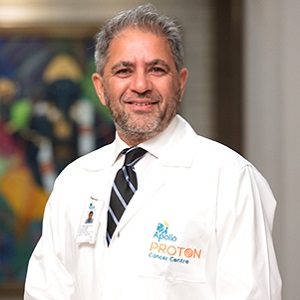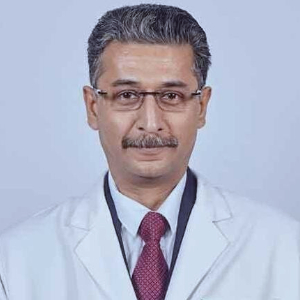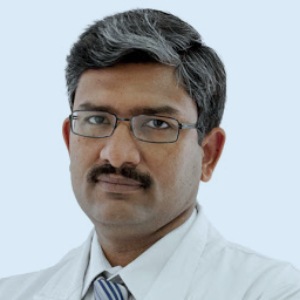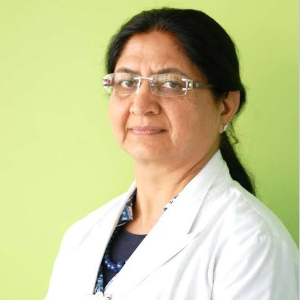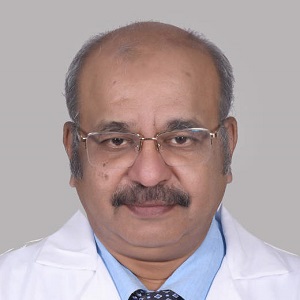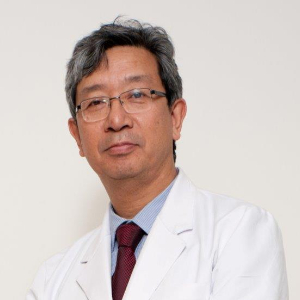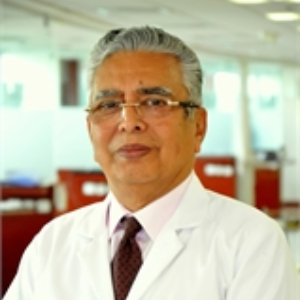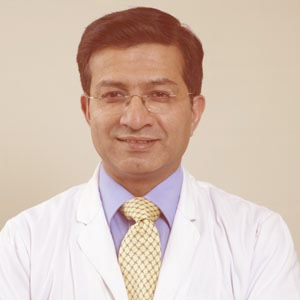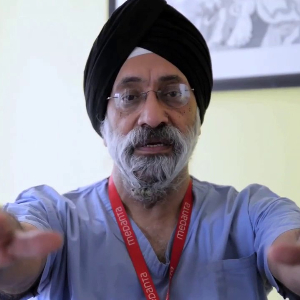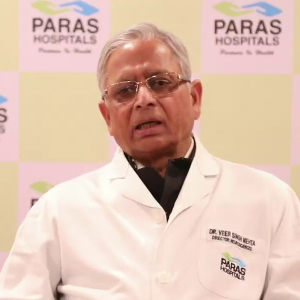Best Stereotactic Radiosurgery Doctors in india
- Neuro Oncologist, Chennai, India
- Over 28 years’ experience
- Apollo Proton Cancer Centre
Profile Highlights:
- Dr. Rakesh Jalali is undoubtedly one of the top Radiation Oncologists in the country who is renowned for his high-precision radiation techniques.
- He provides a wide range of radiation treatments customized to treat different kinds of cancers.
- Dr. Jalali, who has a remarkable 28-year of experience in the field of Neuro-Oncology, is highly proficient in employing sophisticated radiation treatment procedures, such as Electron Beam Radiation treatment (3DCRT), IMRT, IGRT, VMAT, BRT, SABR, DIBH, Brachy Treatment, TBI, and TSET, as well as 4D Gated Radio Treatment. These treatments are carefully employed to treat various kinds of cancers such as brain tumors, breast cancer, lung cancer, prostate cancers, and many more.
- Neurosurgeon, Gurugram, India
- Over 22 years’ experience
- Fortis Memorial Research Institute
Profile Highlights:
- Dr. Sandeep Vaishya is a renowned Neurosurgeon in India, with over 22 years of proficient experience in the field of advanced neurosurgery.
- He has closely worked with some of the top-notch institutes and hospitals in India.
- Dr. Vaishya is regarded as one of the top surgeons of Gamma Knife Surgery in South Africa and is also considered a renowned surgeon for brachial plexus injuries.
- Additionally, Dr. Vaishya specializes in minimally invasive and image-guided neurosurgery, intracranial tumor surgery (including skull base tumors), functional neurosurgery, spinal surgery, and brachial plexus & peripheral nerve surgery.
- Top Neurosurgeon | Artemis Hospital | Gurugram, India
- 25+ years experience
- Artemis Hospital, Gurgaon
Profile Highlights:
- Dr. Aditya Gupta is one of the top Neurosurgeons in India functioning as the Chairperson of the Department of Neurosurgery & CNS Radiosurgery and Co-Chief of Cyberknife Centre at the Artemis Hospitals in Gurugram, India.
- He is renowned for pioneering advanced surgical techniques in treating various brain tumors, specializing in microsurgery and radiosurgery. His expertise extends to managing Movement Disorders with Deep Brain Stimulation (DBS), epilepsy surgery, nerve and brachial plexus surgeries, as well as treating brain aneurysms and AVMs. He is also highly skilled in spine surgery, having performed a wide range of procedures.
- Dr. Gupta graduated as a topper from All India Institute of Medical Sciences, New Delhi. He later served as Faculty and Associate Professor of Neurosurgery until 2009.
- Radiation Oncologist, Gurugram, India
- Over 32 years’ experience
- Medanta-The Medicity, Gurgaon
Profile Highlights:
- Dr. Tejinder Kataria is a globally renowned Radiation Oncologist whose pioneering contributions have significantly advanced cancer treatment in India.
- With over 35 years of experience, she has been instrumental in introducing cutting-edge technologies and establishing prominent oncology departments across prestigious institutions. She is currently the Chairperson of Radiation Oncology at Medanta – The Medicity in Gurugram, New Delhi.
- Dr. Kataria played a pivotal role in founding the Department of Radiation Oncology at Rajiv Gandhi Cancer Institute, New Delhi, and Artemis Health Institute, Gurugram. She also established the Division of Radiation Oncology at Medanta, Gurugram, where she continues to innovate and lead.
- Her interests lie in Stereotactic Radio Treatment (SBRT), Image-Guided Radio Treatment (IGRT), Intensity Modulated Radio Treatment (IMRT), 3-D Conformal Radiation (3D CRT), PET-CT, MRI, SPECT, DSA and CT-Simulator fusion for treatment planning.
- Top Radiation Oncologist | Apollo Hospital, New Delhi, India
- 20+ Years Experience
- Indraprastha Apollo Hospital, New Delhi
Profile Highlights:
- Dr. G K Jadhav is one of the leading radiation oncologists in India.
- He has a complex understanding of cancer biology, clinical care, and radiation physics.
- Dr. Jadhav has an experience of more than 20 years in the field of radiation oncology.
- Top Neurosurgeon | Fortis Memorial Research Institute | Gurugram, India
- 32+ years’ experience
- Fortis Memorial Research Institute
Profile Highlights:
- Dr. Rana Patir is one of the most experienced and highly qualified Neurosurgeons in India.
- He holds an extensive experience of 32+ years as a neurosurgeon and has performed more than 10,000 neurosurgical procedures till date.
- Dr. Patir is an expert in all kinds of neuro and spine surgeries with a specialization in minimally invasive brain and spine surgery, Epilepsy surgery, pediatric neurosurgery, and neurovascular surgery.
- Radiation Oncologist, Gurugram, India
- Over 40 years’ experience
- Artemis Hospital, Gurgaon
Profile Highlights:
- Dr. Subodh Chandra Pande is a well-known radiation oncologist in India. He has a long and rich clinical and teaching experience in the specialty of radiation oncology.
- He included a Dual Energy Linear Accelerator with Multi-Leaf Collimator at Bhagwan Mahaveer Cancer Hospital and Research Centre (BMCHRC), Jaipur & which was a first for the State of Rajasthan.
- Top Neurosurgeon | Max Hospital, Saket, New Delhi, India
- 20+ Years Experience
- Max Super Specialty Hospital, Saket, New Delhi
Profile Highlights:
- Dr. Bipin Walia is one of the most famous neurosurgeons who has performed over 7000 successful neurosurgeries so far.
- Dr. Bipin Walia specializes in image-guided surgery, disc replacement, and endoscopic disc surgery, including endoscopic cranial surgery. His expertise also includes brain tumor surgery and a special focus on minimally invasive surgery for spinal tumors.
- He earned his MBBS and MS (General Surgery) degree from Armed Forces Medical College, Pune, followed by which his, M.Ch(Neurosurgery) from All India Institute of Medical Sciences, New Delhi.
- Dr. Bipin Walia has over 20 years of experience with his outstanding performance earning him quite some rewards and recognition.
- Top Neurosurgeon | Medanta_ The Gurugram | India
- 30+ years’ experience
- Medanta-The Medicity, Gurgaon
Profile Highlights:
- Dr. V P Singh is a renowned Neurosurgeon with over 30 years of veteran experience. His competence in cranial, spinal, and peripheral nerves has helped him successfully perform 400+ Intracranial Aneurysm surgical procedures.
- Dr. Singh has also been credited for initiating the Gamma Knife Unit and epilepsy surgery program at All India Institute of Medical Sciences, New Delhi.
- He is proactively involved in the treatment of arteriovenous malformations by radiosurgery techniques and is currently the chairman of the Institute of Neurosciences, Medanta.
- Neurosurgeon, Gurugram, India
- Over 38 years’ experience
- Paras Hospital Gurugram
Profile Highlights:
- Dr. (Prof.) V S Mehta is a leading Neurosurgeon in India and is considered among the best neurosurgeons in the world.
- He holds an experience of over 38 years in the field and is an expert in Brachial Plexus Surgery, Brain Stem Surgery, Brain Tumour
- He has been honored with the Padma Shri for his dedication and contributions to neurosurgery and spine surgery in India.
- In Paras Dr. V S Mehta has been part of the team to first use the Image-Guided Brain Tumor Navigation Technology for Brain tumor surgery in India.
Best Stereotactic Radiosurgery Hospitals in India
- City: Gurugram, India
Hospital Highlights:
- One of India’s best and largest multi-specialty hospitals, Medanta was built with the aim to bring India to the highest standards of medical care. The hospital has been providing the best medical services to its patients, since its inception, with care, commitment, and compassion.
- Equipped with 1250 beds, the hospital was founded by Dr. Naresh Trehan in the year 2009 with an aim to provide the best medical care at affordable costs. The hospital is spread across 43 acres and includes 45 operation theatres and 350 beds dedicated solely to ICU. The hospital includes over 800 doctors, and more than 22 specialty departments and has a dedicated floor for individual specialty in order to offer the best services under one roof.
- The hospital is considered one of the premier institutes in India for Cardiac Care and includes staffs and members of high caliber. The hospital has 6 distinct centers of excellence.
- City: Gurugram, India
Hospital Highlights:
- Artemis Hospital, established in 2007 in Gurugram, India, is a leading multi-specialty institution known for its excellence in patient care and advanced medical technology, offering comprehensive services across specialties like Cardiology, Oncology, Neurology, Orthopedics etc.
- Renowned for its patient-focused care, Artemis Hospital combines state-of-the-art infrastructure with a team of internationally trained doctors and surgeons, ensuring the highest standards of medical treatment.
- Accredited by JCI and NABH, Artemis Hospital meets global healthcare quality and safety standards, reflecting its commitment to providing compassionate, personalized care.
- The hospital is recognized for utilizing cutting-edge diagnostic and ther*peutic techniques, ensuring patients receive accurate diagnoses and effective treatments tailored to their needs.
- City: Chennai, India
Hospital Highlights:
- The Apollo Proton Cancer Centre in Chennai is the most sought-after private cancer hospital in India. It is an integrated facility that provides cutting-edge, all inclusive cancer treatment to patients all over the globe.
- The hospital is a part of the renowned Apollo Group which has a large network of over 74 hospitals in India and across the globe. Out of the 74 hospitals, 21 of them are cancer centres. However, Apollo Proton Cancer Centre is the only cancer hospital to have JCI accreditation.
- The Centre, which was established on the principles of excellence and expertise, unites a formidable medical staff led by some of the most illustrious figures in cancer treatment.
- The hospital follows the global ASTRO Model Policy. It is the same global policy which is followed by countries like USA, UK, and Europe.
- Apollo Proton Cancer Centre is among the very few hospitals in India to receive patients from First World countries such as USA, Canada, New Zealand, Australia, Singapore, Thailand, etc.
- Apart from that, it is also the first hospital in Chennai to receive patients from several countries like Uzbekistan, Kazakhstan, Turkmenistan, Georgia, Armenia, Azerbaijan, SAARC countries (Bangladesh, Nepal, Sri Lanka, Maldives, Bhutan, Afghanistan, and Pakistan), South Africa, Turkey, Egypt, etc.
- In fact, there is a dedicated team at the Apollo Proton Cancer Centre that serves only international patients. Thus, on a monthly basis, the Centre receives patients from across 32 countries.
- Moreover, there are certain treatments in Apollo Proton Cancer Centre that are not available in any other centre. APCC addresses all types of possible cancers that are usually not covered by any other centre.
- City: New Delhi, India
Hospital Highlights:
- Over the last 33 years, the Fortis Escorts Heart Institute has set new standards in cardiac treatment with groundbreaking research. It is now known around the world as a centre of expertise for Cardiac Bypass Surgery, Interventional Cardiology, Non-invasive Cardiology, Paediatric Cardiology, and Paediatric Cardiac Surgery.
- The hospital has cutting-edge laboratories that perform a wide range of diagnostic tests in Nuclear Medicine, Radiology, Biochemistry, Haematology, Transfusion Medicine, and Microbiology.
- Fortis Escorts Heart Institute boasts a diverse group of bright and experienced doctors who are backed up by a team of highly qualified, experienced, and devoted support professionals as well as cutting-edge equipment such as the recently installed Dual CT Scan.
- Approximately 200 cardiac doctors and 1600 personnel currently collaborate to manage over 14,500 admissions and 7,200 emergency situations each year. The hospital now has a 310-bed infrastructure, as well as five cath labs and a slew of other world-class amenities.
- City: Gurugram, India
Hospital Highlights:
- Fortis Memorial Research Institute (FMRI) is a premier multi-super-specialty, quaternary care hospital, known for its exceptional international faculty, top-tier clinicians, super-sub-specialists, and specialized nurses, all supported by cutting-edge technology.
- It is the flaship hospital of Fortis Healthcare Limited, part of IHH Healthcare Berhad, a leading integrated healthcare services provider in India. As one of the country’s largest healthcare organizations, Fortis operates 28 healthcare facilities with over 4,500 operational beds (including O&M facilities) and more than 400 diagnostic centers (including joint ventures).
- Recognized as one of the top hospitals in India, FMRI serves as a leading referral center and aspires to be the ‘Mecca of Healthcare’ for India and beyond. Its 11-acre campus is a testament to its commitment to providing world-class healthcare.
- Accredited by JCI and NABH, FMRI is dedicated to maintaining the highest standards of healthcare quality and safety, ensuring that every patient receives the best possible care. The hospital’s reputation is further enhanced by its state-of-the-art facilities and innovative medical practices.
- City: New Delhi, India
Hospital Highlights:
- The Indian Spinal Injuries Center (ISIC), provides state-of-the-art facilities for the management of all types of spinal ailments.
- Staffed with internationally trained, acclaimed, and dedicated spine surgeons, the hospital provides cutting-edge medical & surgical technology. The hospital provides comprehensive management of spinal injury, back pain, spinal deformities, tumors, osteoporosis, etc.
- The hospital performs motion-preserving spine surgeries including disc replacement and dynamic fixation, and minimally invasive spine surgeries such as endoscopic disc excision.
- The orthopedic service of the hospital covers all orthopedic ailments including trauma, joint diseases & replacements, oncology, pediatric orthopedics & upper limb ailment.
- City: Faridabad
Hospital Highlights:
In the sprawling city of Faridabad, where healthcare needs are diverse and ever-evolving, one institution has consistently stood out as a beacon of excellence in the field of medicine—Marengo Asia Hospital. Established with a vision to provide world-class healthcare services to the community it serves, Marengo Asia Hospital has emerged as a trusted name synonymous with quality, compassion, and innovation in healthcare.
- City: New Delhi, India
Hospital Highlights:
- Indraprastha Apollo Hospital is a 700-bedded multispecialty hospital in the heart of the capital of India. It is a part of Apollo Hospital group, one of India’s most reputed healthcare chains. Indraprastha Apollo Hospital has been accredited by Joint Commission International, making it the first internationally accredited hospital in the country in 2005.
- There are 52 specialties in the hospital with one of the best cardiology centers in the country. The hospital is also equipped with State of the art infrastructure facilities with the largest Sleep Lab in Asia and the largest number of ICU bed facilities in India.
- The latest and highly advanced technologies that are installed in the hospital include Da Vinci Robotic Surgery System, PET-MR, PET-CT, Cobalt-based HDR, Brain Lab Navigation System, Tilting MRI, Portable CT scanner, 3 Tesla MRI, 128 Slice CT scanner, DSA Lab, Endosonography, Hyperbaric Chamber and Fibro scan.
- City: New Delhi, India
Hospital Highlights:
- One of the well-regarded providers in India committed to the highest standards of clinical excellence and patient care, Max Super Specialty Hospital is a part of Max Healthcare, which is the second-largest healthcare chain in India. Regarded as one of the most well-regarded healthcare providers in the country, Max Super Specialty Hospital is committed to the highest standards of clinical excellence as well as patient care. The hospital is also equipped with the latest technology as well as cutting-edge research. The hospital is known to deliver and ensure the highest level of patient care.
- The hospital has more than 500 beds and offers treatment for over 35 specialties. The hospital also holds the credit of having installed the first Brain Suite in Asia. This is a highly advanced Neurosurgical machine that allows MRI to be taken while surgery is ongoing.
- Other advanced and latest technologies are also installed in the hospital such as the 1.5 Tesla MRI machine, 64 Slice CT Angiography, 4D ECHO, LINAC, and 3.5T MRI machine.
- City: Kolkata, India
Hospital Highlights:
- Founded in 2017, the HCG EKO Cancer Centre is a committed, all-inclusive cancer care facility in Kolkata.
- The hospital was collaboratively established by India’s leading cancer care provider HCG (HealthCare Global Enterprises Ltd.), and EKO Diagnostic Pvt. Ltd., a top diagnostic and imaging chain in Eastern India.
- With 88 beds, the hospital provides a full spectrum of services including diagnosis, prevention, screening, second opinions, treatment, rehabilitation, follow-up, and palliative care.
- Additionally, the hospital contains a day-care chemotherapy ward, Neutropenic ward, medical ICU, pharmacy, blood bank, and an IPD wing.
- At HCG EKO Cancer Centre Kolkata, a large team of cancer experts with experience in medical oncology, surgical oncology, radiation oncology, hemato oncology, BMT, and nuclear medicine collaborate to offer a variety of treatment options under one roof.
- Furthermore, the hospital is also known for employing the most advanced radiation technology such as, the Radixact, a next-generation TomoTherapy equipment that provides greater radiation delivery precision.
Stereotactic Radiosurgery
When doctors are unable to treat a disease with surgery due to the location of the problem or the health of the person who needs the treatment, then they might consider stereotactic radiosurgery (SRS) to address some of these problems.
Stereotactic radiosurgery is a form of radiation treatment that makes the use of focused delivery of radiation in high doses to precise locations in your body. It can be used to treat certain kinds of tumors and other abnormalities in the spine, brain, neck, lungs, or liver.
The technique was developed in the 1950s by Swedish neurosurgeons to treat small tumors located deep in the brain without causing damage to the nearby healthy tissues. Doctors now use this technique to treat any part of the body where tumors are hard to reach or are close to any vital organs.
Purpose
Though stereotactic radiosurgery was initially developed to treat small, deep brain tumors, now it is used for a wider array of problems in the brain as well as other parts of the body. Doctors now use this method for treating areas in the brain or anywhere else that are hard to reach or close to vital organs or they also use it to treat tumors that have moved within the body. Various problems can be addressed with Stereotactic radiosurgery, some of them including:
- Deep brain tumors
- Pituitary tumors
- Cancers of the eye
- Residual tumor cells after surgery
- Neurological problems, such as trigeminal neuralgia
- Arteriovenous malformations, which are tangled blood vessels leaking and disrupting your normal flow
- Parkinson’s disease
- Epilepsy
- Tumors in the liver, lung, spine, prostate, abdomen, head, and neck
Generally, doctors prefer stereotactic for treating older adults or people who are too sick to undergo conventional surgery. Sometimes, after some undergo surgery for removing a cancerous tumor, a doctor can use stereotactic radiosurgery to kill any remaining tumor cells that the surgeon might have missed.
Preparation
You will generally have one or more imaging scans, such as a CT scan or an MRI, before your treatment. Your doctor might inject a contrast agent as it can help them understand the size and location of the tumor or any other structure that they will need to treat. A lot of planning will go into structuring your treatment as well.
Let your doctor know about any medications you are taking or any implants or devices that you have such as:
- A pacemaker
- An artificial heart valve
- Stents
- Implanted pumps
Remember not to eat after midnight on the day of the procedure. Also make sure that you remove items such as eyeglasses, contact lenses, or dentures before the treatment.
Procedure
The procedure can be of various types depending on your condition.
Gamma knife radiosurgery involves aiming nearly 200 beams of highly focused gamma radiation at the target region, such as a tumor. This is used for small- to medium-sized brain or head and neck abnormalities as well as functional brain disorders such as essential tremor.
Linear accelerator machines can involve the use of high energy X-rays to target large tumors by delivering radiation over several treatments. This is sometimes termed as CyberKnife technology.
Proton beam or heavy-charged-particle radiosurgery is used by the doctor for treating smaller tumors throughout the body.
All these methods require a lot of imaging with CT scan, MRI, or maybe other methods, so that your doctor will know where exactly the tumor is, as well as its size.
The professionals in your surgery team can include:
- a radiation oncologist
- a dosimetrist
- a radiologist
- a medical radiation physicist
- a radiation therapist
- a radiation therapy nurse
It is important for you to stay completely still for these methods to work. This will help to ensure that your doctor is able to target the radiation to the affected tissues and that the treatment doesn’t affect as much of your normal tissue. Your doctor might also place strips on you so that you are immobile, or they might place a special facemask or a frame that attaches to your scalp to keep you from moving during the treatment.
You will lie down on a table which will be sliding into a machine. This machine might spin around you to change the angles of the radiation beams. Throughout the procedure, your healthcare team will be able to watch you on a camera. You will be able to speak to them through a microphone if you experience any problems.
Generally, the treatment takes around 30 minutes to one hour. Though your problems should be addressed in a single session, in a few cases, additional treatments can be required.
After the procedure
You should be able to eat and drink after the procedure is complete. You might experience minor bleeding or tenderness at the pin sites. If you experience any headache, nausea, or vomiting after the procedures, you will receive appropriate medications.
It generally takes weeks or sometimes even months for the targeted cells to stop reproducing and die off. Your doctor will continue to check the size of the tumor and the treated area using CT scans and MRI.
Risks
Since stereotactic radiosurgery doesn’t involve surgical incisions, it is generally less risky as compared to traditional surgery.
Some of the early complications or side effects that might occur after the surgery include fatigue, swelling in scalp and hair problems.
In some cases, people might also experience late side effects, such as any kind of neurological problem. This can happen several months after the treatment.

